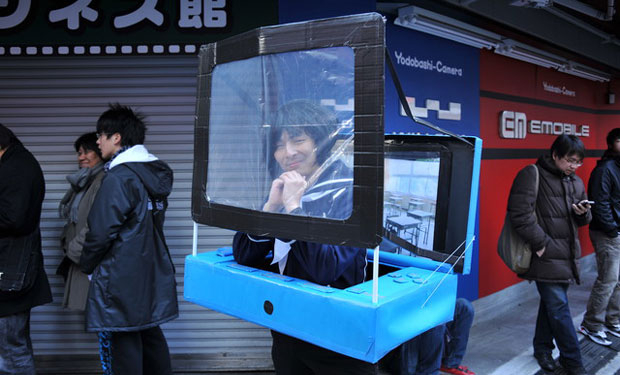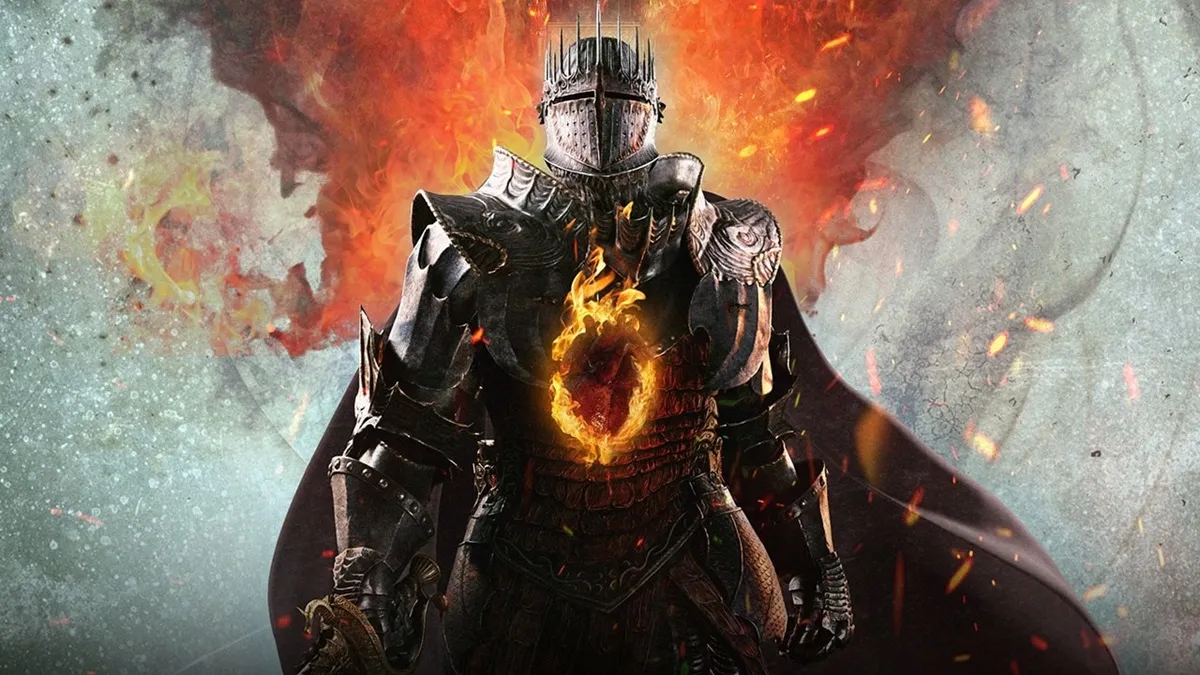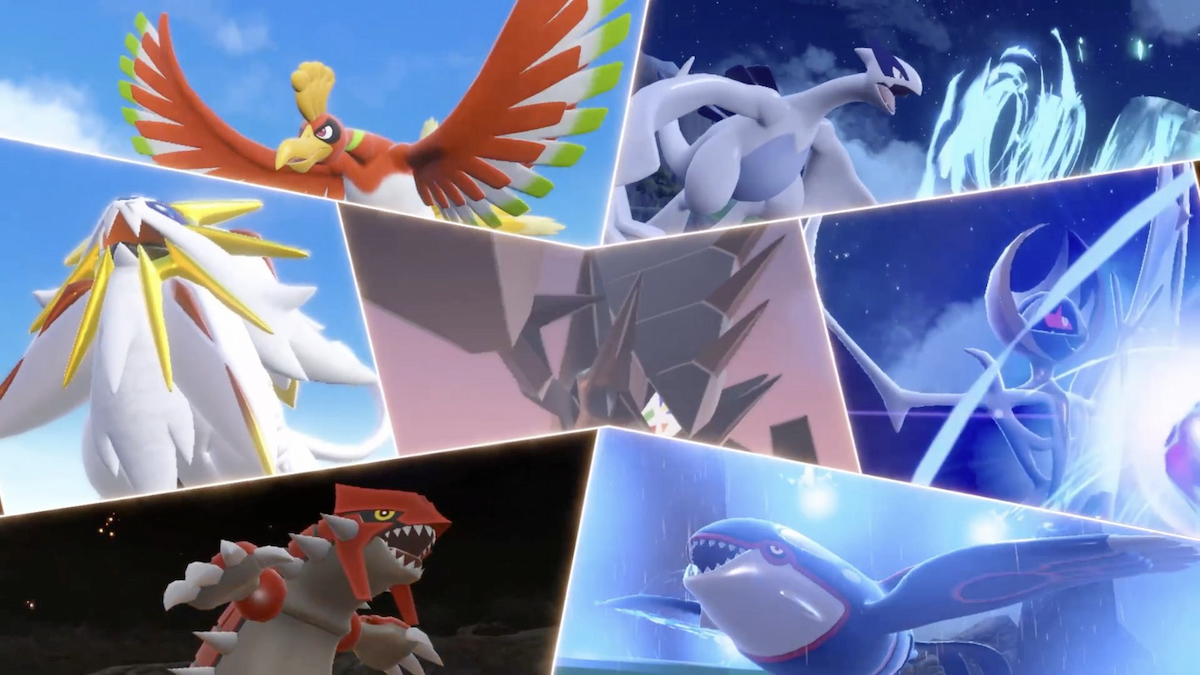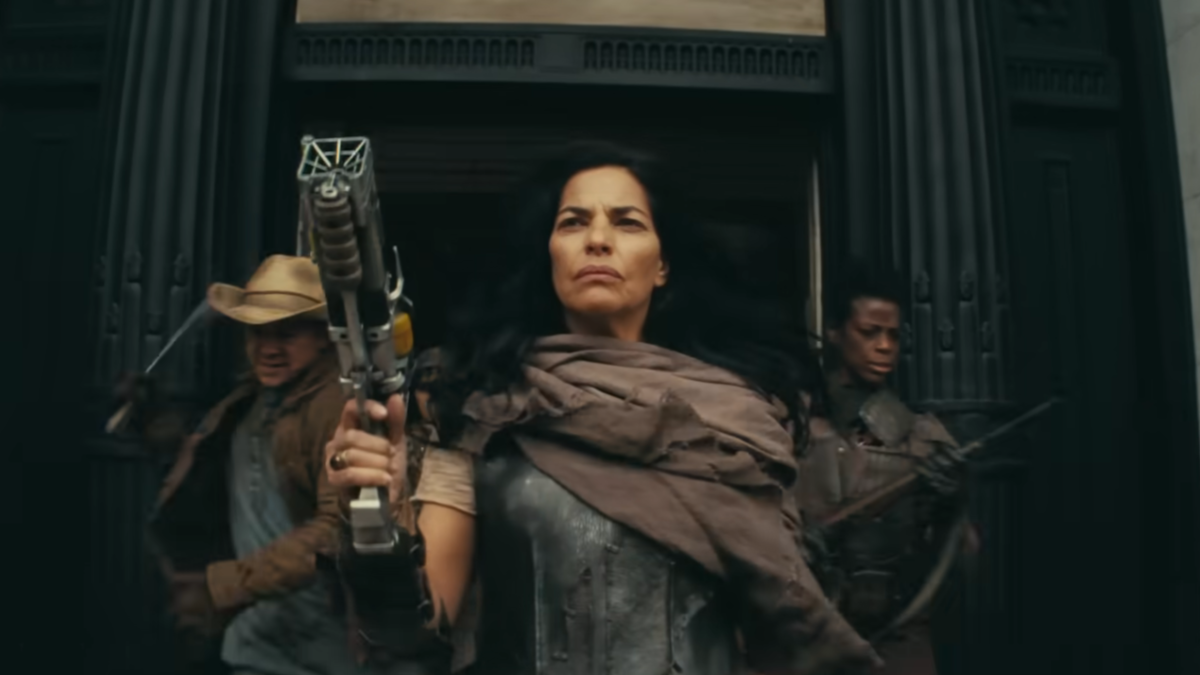[Note: We’re not just a (rad) news site — we also publish opinions/editorials from our community & employees like this one, though be aware that they may not jibe with the opinions of Destructoid as a whole, or how our moms raised us. Want to post your own article in response? Publish it now on our community blogs.]
Right this minute, the Nintendo 3DS is in the hands of thousands of eager Japanese shoppers. In a month’s time, the rest of the world will get its turn. And if all the cards are played right, Sony’s “Next Generation Portable” will see release by year’s end. Meanwhile, there’s always the iPhone and its bevy of dirt-cheap gaming apps, in addition to other mobile markets hoping to get a piece of that app(le) pie.
If you’ve never been big on handheld gaming, there’s no better time to take the plunge than now.
A couple weeks back, Destructoid editors Samit Sakar and Josh Tolentino wrote a pair of contrasting articles arguing whether the NGP would fail or succeed, respectively. It’s an interesting debate, but I prefer to look at the bigger picture. Instead of weighing the merits of one handheld device over another, I’m wondering if handhelds could possible overtake home consoles in the press and public mind share over the next few years. Even if they don’t, I’m personally ready to hang up my controllers and go purely portable.
Frankly, I don’t see the point in home consoles anymore when handhelds are clearly superior.
Today’s devices are a far cry from the spinach-tinted OG Game Boy. Despite the explosive popularity of the big gray brick, no one could honestly claim that it (or any of its DOA competitors) was a proper substitute for a home console. The division was very clear — you played the big, meaty titles on your Nintendos or Geneses or PlayStations, then you played those titles’ lilliputian, oftentimes forgettable spin-offs on your Game Boys. Aside from the rare poster child like Pokémon, these games were distractions until you could get back to the real gaming on the TV.
As handheld technology and software advanced, that mindset never quite went away. Friends I’ve spoken with over the years have offered various reasons for their disinterest in portables. All their concerns can be boiled down to a matter of compromise — handhelds demanded that they altered or lowered their expectations of quality. Despite my own long-standing love affair with the Game Boy family, I’d have to agree with their assessments.
Then I bought a DS and everything changed for me. I’ve played some of the most remarkable games of the past generation, from Phoenix Wright to Nine Hours, Nine Persons, Nine Doors, from Rhythm Heaven to Professor Layton. I’ve enjoyed Castlevania in 2D while home consoles muck about with 3D and fighting nonsense. I’ve spent hours glued to the mini screen, all while my home console backlog continued to pile up. Before I tackle that mountain, I’m more likely pick up a PSP to catch up on all those gems I’ve been missing from the other camp.
It’s not just the games, either. It’s the ease and convenience of have having a little contraption that sits on the coffee table, calling out to me. It’s being able to enter sleep mode and go about my business without worrying about battery drain. It’s not having to essentially schedule appointments with my TV in an environment where it’s difficult to sit undisturbed in a single spot for any length of time.
I’m convinced that even if conditions were perfect, I’d still prefer to curl up somewhere with my DS in tow. It goes without saying that your mileage may vary, that your experiences may favor home consoles. Still, don’t you think it’s time for a change? Would you be willing to reevaluate your gaming habits?
I’m dead serious when I state that handhelds are now superior to home consoles, but I can sense the furious rebuttals ready to drown the comments. Before that happens, allow me to address some common arguments that keep popping up when people wish to discredit portables.

“I’d much rather play on a big TV!”
This is my favorite line of ’em all, so I’ll tackle this bad boy first.
Everybody loves a big TV. Why? Is there any practical purpose in having a set barely fits on the wall? Of course not. We buy big TVs because we have convinced ourselves that we’ll miss some infinitesimal detail if our sets aren’t the length of a regulation ping-pong table.
What happens when you buy a TV several times larger than one you’re replacing? You’re probably going to move the couch back a couple of feet. Why would you do that? To achieve optimal viewing distance. If the TV were smaller, we’d sit a bit closer, wouldn’t we?
Now, where do you hold a handheld when you are playing it? Between one and two feet away from your face, most likely. Chances are that miniature screen is taking up about as much visual “real estate” as that TV on the wall six feet away. In fact, you’re probably seeing a better picture on the smaller screen!
Listen, this isn’t 1989 anymore. The Game Boy had a postage stamp-sized, four color-max display that needed a direct external light source to view correctly. All of today’s portable devices, both gaming hardware and smartphones, have rich, backlit screens that can be viewed comfortably without much strain over extended periods of time. Each of these devices also has a higher pixel density than just about any TV on the market, meaning you’re getting a sharper image with a better resolution per square inch than on your precious 1080p plasmas!
When was the last time you heard complaints that font on a handheld was too small or blurry to be legible? If you can find a single case, I’ll be surprised. Meanwhile, I can pull up a mountain of examples on today’s home consoles, cases that were non-existent in generations past. All hail high definition.
This television brouhaha is the cornerstone of the argument that home console gaming is more *groan* immersive. Are you kidding me? This crap again? And I bet the 5.1… wait… 7.1 surround sound heightens that experience even further! Guess what. Portables addressed that aural immersion concern on day one. They’re called headphones, and they do the job.

“I want to play comfortably from my couch!”
This one is just plain stupid.
I had no idea that the nature of portables prevented their use on such a common household fixture! Oh wait, that’s bunk! If I want to play my portable on the couch, I will! In fact, maybe I’ll play on my belly! Or upside-down! Or on the toilet! Or out on the patio! Or at the beach!
Say, this portable doohickey is rather versatile! Why would anyone wish to willingly limit that aspect?
Back in the day when momma and poppa would pack you and your siblings into the minivan, all you had to entertain yourself was a Game Boy and a pouch of half a dozen or so games. Portables were and still are the only way to get your gaming fix on the go. Leaving all handheld gaming for traveling is such an ingrained habit that we chose to adhere to it well into adulthood. It ties right back into the belief that playing on a portable is a lesser experience than playing on a home console.
Maybe it’s just me, but I find home consoles quite limiting. You’ve only got the one TV to play on, and it’s not like you frequently up and move the hardware from room to room. If you share the house with other people, then you have to share television privileges.
With a handheld, if someone is giving you grief, you just relocate yourself to a quieter spot. If you are in bed and want to get in some game time, propping yourself up in a comfortable position to play a console plugged into your bedroom TV can be quite the hassle. With a handheld, you can lay on your back, get your fix, shut the device off, place it on the nightstand, then drift to sleep.
When it comes to convenience, there’s just no comparison. It’s ridiculous to argue otherwise.

“If I want to play meaty console-length games, I’ll play them on a console!”
Does anyone catch the double standard here? Anyone?
The reason I fell in love with the DS’s software library was because of the healthy balance of quirky, “burst” titles and more demanding ones. Others are of the mind that portables should only be the domain of ADD-style time-wasters, puzzlers, and anything else the falls behind their imaginary segregation line.
However, it’s perfectly okay to have quirky, “burst” titles on home consoles. That’s called “variety.” Look at your shelf of boxed games and count how many are perfect for short sessions. Look at the download distribution services like PSN and XBLA, where the spirit of pick-up-and-play arcade games thrives. What about devices in the past such as the Super Game Boy and the Game Boy Player or the PSP’s TV-out feature, all means that allow portable titles to run directly on your television? I’ve never once heard anyone say, “Uhhhh… hell no! I don’t want that!”
What’s the big deal, anyway? Haven’t we seen some remarkable portable successes from games one would label “home console experiences”? The Final Fantasy ports on the GBA did well for themselves, as did the recent Dragon Quest 9. Monster Hunter only exploded once it wormed its way onto the PSP. Destructoid has even gone out of its way to demonstrate how a portable sequel could raise the bar established by its home console predecessor.
As far as I’m concerned, there is only one thing that a game absolutely needs in order to settle nicely in the handheld space — the ability to save at any time or at least at convenient intervals. Since most handheld games these days do that anyway, I don’t see what the fuss is about.
Oh, I get it. Portable hardware is some sort of “gaming ghetto” that neuters games and dissolves their quintessence. How much fun can you have when you play on a crowded bus, for instance? Gee, I’m so sorry that you personally are so easily disturbed by outside influences. You make it sound like you’re being forced to play in inconvenient environments, preventing you from fully entering “the zone.” I bet you’re the kind of person who locks all the doors, turns off all the lights, and disconnects all the phones before sitting down to a game of Uncharted 2. Don’t sneeze! That might shatter your fragile illusion!
Claiming that one cannot find gaming enrichment on a tiny screen reeks of elitist bile. I don’t care much for that line of thought, Mr. Highbrow.

“Console games will always be better than handheld games!”
Regardless of other concerns, everything boils down to software. If my previous points carried even the slightest shred of objectivity, I can’t confidently say this one does as well. Regardless, I feel that the software future on portables is a lot brighter than the one on home consoles.
The gaming industry is at a crossroads, and what made money yesterday won’t necessarily make money tomorrow. A year ago, I wrote an article in which I expressed disappointment in the current market environment and predicted that companies would begin making sweeping changes in the near future. Among those changes is a heavy marginalization of home console software.
There are three types of software we can look forward to playing on home consoles from here on out. First is the big-budget, sure-fire mainstream goliath. Companies have become so risk-averse that even a middle-of-the-road effort would be too much of a waste of resources. There was a time when we could expect a Katamari Damacy surprise breakthrough or a healthy distribution of 3D platformers and JRPGs. But when even average games these days need to sell at least half a million copies just to break even, it’s clear why a company would prefer to hedge its bets on fewer titles with greater potential gains.
Is that a bad thing? Depends. You’ll get more solid games like Assassin’s Creed and Gears of War, though they’ll typically be sequels or conceptual copycats with very little variance. if you have only so much time and money to spend in a given year, wouldn’t you want assurance that what you are playing will hold value? Still, big budgets are no guarantee of true value, and you’ll lose out on those risky but quaint titles that used to be more prevalent.
Second is the motion-controlled, family fun fest. Microsoft and Sony recently trundled out their answers to Nintendo’s Wii, with Kinect seeing far more success than the Move. The games stocking these fires get players up-and-moving and dancing-and-grooving. Unfortunately, these titles haven’t done much to evolve motion-control gaming beyond what the Wii did four years ago.
I used to be excited by the prospects of motion controls, but my enthusiasm fizzled when “new” hits turned out to be more sports compilations, dance games, or some other dull, non-threatening concept. Even Nintendo, the pioneers of this craze, appear to have given up on ever doing anything significant with their tech again. They’ve got, what, Skyward Sword that uses the under-utilized MotionPlus? What else? Their biggest first party titles over the past couple of years barely exploit any of the features that made the Wii popular in the first place.
These motion-controllers were introduced so that hardware manufacturers would gain competitive leverage by forcing exclusive experiences on their machines. It’s too bad most developers have no patience to properly exploit the technology.
Last is the downloadable service title. Those studios that can’t cut it in brick-and-mortars anymore have found a way to spend less money to make more money on a breadth of clever ideas. If a game bombs on XBLA or PSN, it’s not the death knell it would have been had the game been boxed and rotting on a shelf. The sky is the limit with what one can accomplish in the download space. If consoles had any kind of a rosy future, it would be right here.
On that note…
Isn’t this the perfect distribution channel to deliver software to portable devices? Downloadable games succeed in part because they don’t rely on the full capabilities of the hardware they run on. With the 3DS and NGP opening up their downloadable services even wider than their predecessors had, and with the App Store appearing so enticing, I can see a lot of formerly console-exclusive downloadable games finding their way onto portables very soon I mean, we already have stuff like World of Goo on the iPad and Cave Story on DSiWare. C’mon! Wouldn’t you like to have a copy of Super Meat Boy to carry around with you? Is it really a stretch to imagine that this could happen on a larger scale?
Studios are afraid that a new home console would take current astronomical game budgets and raise them even higher. However, without the burden of console-scale development costs, portable games can be as large and ambitious or as small and quirky as developers want them to be. How could that not sound appetizing?
Just look at Japan, where home consoles have stagnated as portables cement their domination even further. With the 3DS, we’ve seen a massive influx of third-party support from Japanese studios who seem more than happy to leave console hassles behind. Will the NGP have that same level of support? At least in Japan, where the PSP has run neck-and-neck with the DS, it’s a possibility.
Will Western companies wisen up to the fact that handhelds are no longer a dumping ground for second-rate efforts? They sure as hell ought to. Even Epic Games, a company that has historically been anti-portable, has thrown its hat in the ring with Infinity Blade for the iPhone. Talk about changing tides!
Ultimately, my decision to invest more deeply in portables going forward is my own. Will I miss out? Maybe. But I’m afraid I’d miss so much more if I maintained this archaic notion that home consoles are intrinsically more fulfilling for my gaming needs. I haven’t felt that way in a long while, so I might as well take the few extra steps and complete the transition.
Care to join me?




